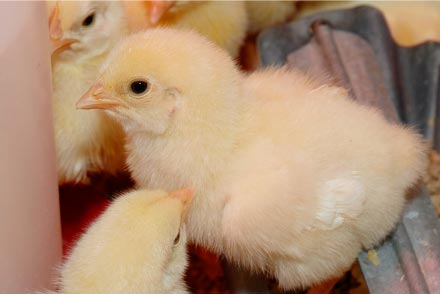
Chick Tips
Chick season is here! As always, preparation is the best way to ensure success! Preparation begins with knowing how many eggs you want after they start laying. The average hen will typically give you 5-6 eggs per week. 3 hens could give you 2-3 dozen per week.
Temperature: A Draft Free environment is the most important condition to be aware of. A heated area is a must. The temperature should be 95 degrees when you bring them home. Be sure to preheat the area the day before with food and water to be ready for the arrival of your new flock!
Each week you can lower the temperature 5 degrees until it’s about 75 degrees at 5 weeks of age.
*Remember, that’s the temperature at the chick’s height, not room temperature.
If your chicks are lying directly under the heat light, they are too cold. If they are on the outside edge, they’re probably too warm. Adjust the heat light up or down to where they are comfortable.
Space: Once again, draft free is a must, but there should be some air exchange to get rid of carbon dioxide and the ammonias created by their urine. A small area in the beginning is always good! You can cut up a piece of corrugated cardboard to use for walls in an area and expand it as they grow.
Look out for plastic containers such as tubs and totes; they do not have any air exchange. If you are using something with high walls, cut or drill holes in the sides at the chick’s level for ventilation.
Feed & Equipment: You need to plan about 2-3” of feeder space per bird in the beginning and it should have a cover of some sort to prevent them from getting manure in their feed. Their watering container should be large enough to provide them water all day. It should have a small lip so they can reach over but not get in. Look out for their bedding; they will kick it into the trough. They should have fresh water each day, just like you would want to drink.
Feed: Feed is easy! They’ll need Chick Starter Only! You can decide whether to feed them medicated or non-medicated. The chick starter can be fed to them until they lay their first egg, or you can switch them to a flock raiser type of feed around 6-8 weeks of age. Scratch, meal worms and other yummy treats can also be given to them after a few weeks of age.
Chicken Breeds: You pick! There is a wide variety of breeds to choose from. In most backyard flocks, they will all produce similarly if they have access to proper housing, food & water.
If you want eggs, get a laying breed. They typically will start laying eggs around 5-6 months of age.
If you are looking for meat, you’ll want to get a broiler or fryer. They will typically be ready to process between 6-8 weeks depending on the size you desire.
When are they ready to go outside: By 5-6 weeks of age your chicks should be ready to move outside full-time. You’ll want to make sure that they are fully feathered to protect them against the weather.
Enjoy your new feathered friends!!
~ Les Geren



